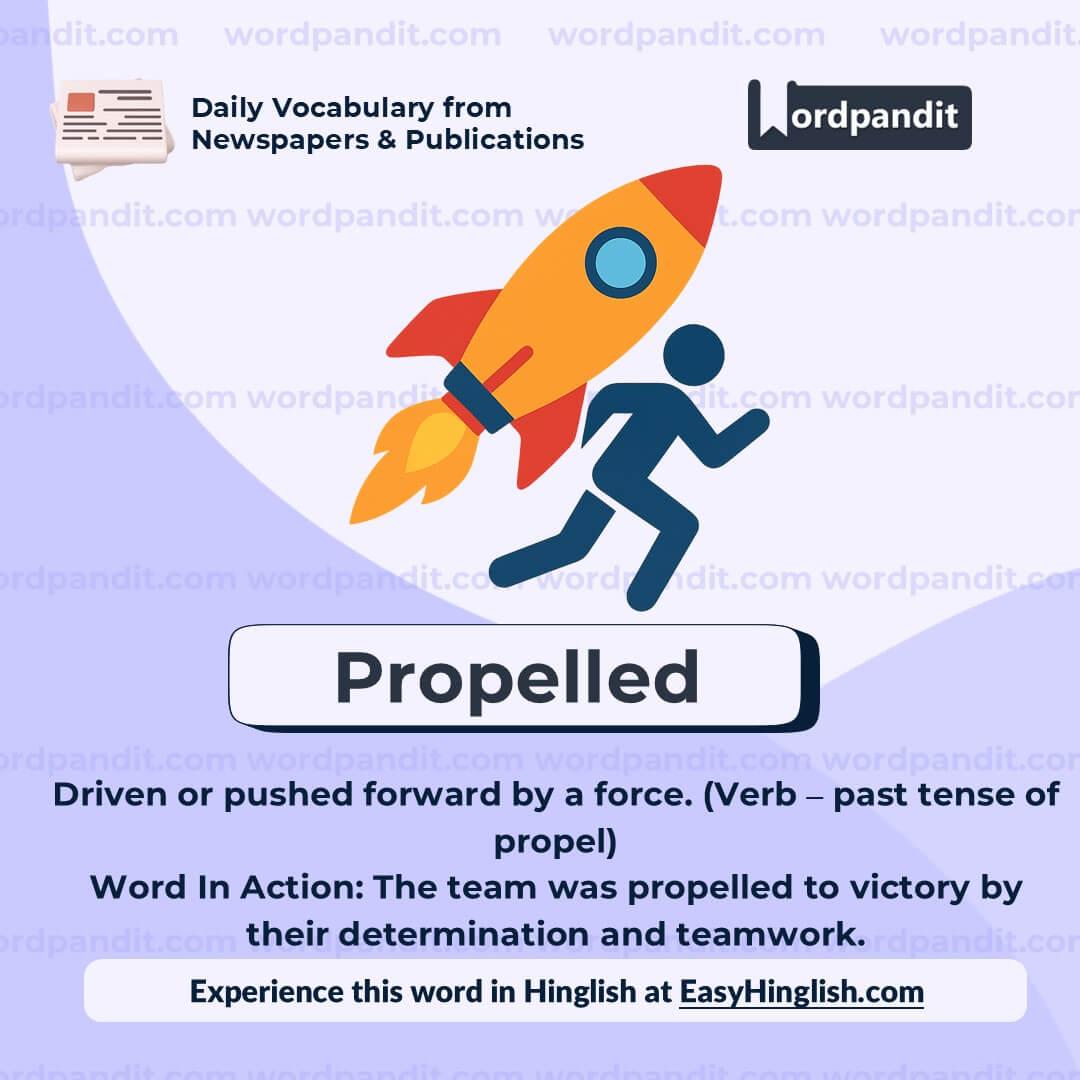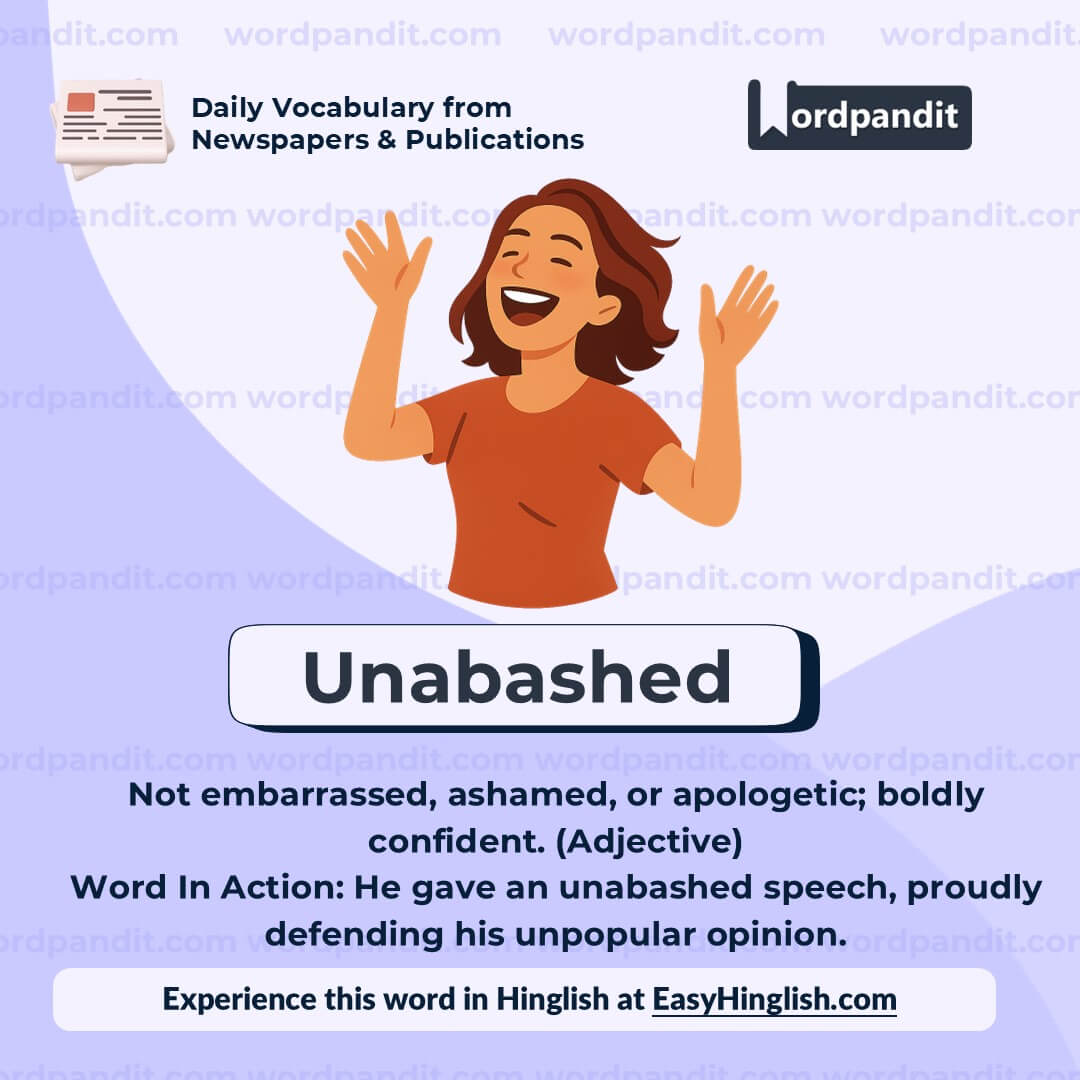Daily Vocabulary from Indian Newspapers and Publications
Welcome to Wordpandit’s Indian Vocabulary Hub
At Wordpandit, we understand the importance of staying rooted in the local context while expanding your language skills. This section focuses on enriching your vocabulary with words and phrases drawn from India’s leading newspapers and publications, ensuring you're learning vocabulary that is practical, relevant, and uniquely Indian.
Why Indian Sources Matter
We believe that the best way to master any language is by immersing yourself in local content. That’s why we carefully curate vocabulary from top Indian publications, including:
- The Hindu
- The Times of India
- The Economic Times
- Hindustan Times
- Live Mint
- The Indian Express
- And many others...
Stay Updated, Stay Relevant
With daily updates from Indian news sources, you’ll be consistently learning words that reflect the trends and shifts in Indian society and culture. Our focus is to provide vocabulary that enhances your understanding of the language in an Indian context.
How Wordpandit Supports Your Goals
Whether you’re preparing for exams, aiming to improve your professional communication, or simply want to stay connected with the latest Indian vocabulary, Wordpandit is here to guide you every step of the way.
Learn with a Practical Approach
Our interactive learning methodology includes real-world examples, engaging activities, and context-specific usage to ensure that every word becomes part of your active vocabulary.
Dive into Indian Vocabulary Today!
Why Choose Wordpandit?
Practical Learning: Focus on words you'll actually encounter in real-world reading, enhancing your comprehension and communication skills.
Diverse Content: From current affairs to scientific breakthroughs, our varied sources expose you to vocabulary across multiple domains.
Effortless Integration: Make Wordpandit a part of your daily routine. Just a few minutes each day can significantly boost your lexicon over time.
Your Path to Vocabulary Mastery
- Visit our Daily Vocabulary section regularly
- Explore new words and their usage in context
- Practice incorporating these words into your own writing and speech
- Track your progress as your vocabulary expands
Start Your Journey Today
Embark on your vocabulary enhancement journey with Wordpandit. By consistently engaging with our daily posts, you'll build a robust vocabulary that serves you well in academic, professional, and personal contexts.
Remember, a word a day keeps linguistic limitations at bay. Make Wordpandit your daily companion in the quest for vocabulary excellence!
WORD-1: Propelled
Context:
"Raymond Dart’s “killer ape theory” argued that human evolution has been propelled by aggression and the ability to kill. Chimpanzees, another close cousin of Homo sapiens, are also known to employ violence both with other species as well as among themselves." - The Indian Express
Explanatory Paragraph:
The word "propelled" refers to something being pushed or driven forward, either physically or metaphorically. In the context of human evolution, it suggests that certain forces, like aggression, acted as powerful motivators or driving energies behind change and progress. Just as an engine propels a vehicle forward, aggression is argued to have advanced human development in this theory.
Meaning: Driven or pushed forward with force (Verb – past participle of “propel”)
Pronunciation: pruh-PELLD
Difficulty Level: ⭐⭐ Moderate
Etymology: From Latin “propellere,” meaning “to drive forward,” from “pro-” (forward) + “pellere” (to drive).
Prashant Sir's Notes:
Often used metaphorically in academic or scientific writing to describe what “drives” or “moves” a process. “Propelled” usually implies strong force or momentum behind the action.
Synonyms & Antonyms:
Synonyms: Driven, pushed, thrust, launched, motivated
Antonyms: Halted, stopped, restrained, delayed
Usage Examples:
- Her curiosity propelled her to travel to remote corners of the world.
- The rocket was propelled into space by powerful fuel boosters.
- The team's determination propelled them to victory despite the odds.
- Technological innovation has propelled major changes in the healthcare industry.
Cultural Reference:
"The force that propels the human spirit is often a mix of passion, need, and resilience." — Inspired by motivational literature
Think About It:
What forces—emotional, social, or environmental—have propelled key changes in your life?
Quick Activity:
Write a sentence using “propelled” to describe a turning point in your personal or professional journey.
Memory Tip:
Think of “propeller” on a plane—it “propels” the plane forward. The word “propelled” works the same way for actions or ideas!
Real-World Application:
In business and innovation contexts, “propelled” is often used to describe how certain ideas or trends drive progress, such as "AI has propelled growth in the tech sector."
WORD-2: Aggression
Context:
"Raymond Dart’s “killer ape theory” argued that human evolution has been propelled by aggression and the ability to kill. Chimpanzees, another close cousin of Homo sapiens, are also known to employ violence both with other species as well as among themselves." - The Indian Express
Explanatory Paragraph:
"Aggression" refers to hostile or violent behavior or attitudes, especially those driven by anger or the intent to dominate or harm. In evolutionary theory, it is sometimes viewed as a survival trait—used to defend, compete, or assert dominance. The term can describe both physical violence and verbal hostility, ranging from animal behavior to human conflict in society.
Meaning: Hostile or violent behavior or attitudes; readiness to attack or confront (Noun)
Pronunciation: uh-GRESH-un
Difficulty Level: ⭐⭐ Moderate
Etymology: From Latin “aggressio” meaning “attack,” from “aggredi” meaning “to attack or approach.”
Prashant Sir's Notes:
Pay attention to contexts—aggression isn’t always negative. In psychology, it’s a studied behavior; in sports, it can mean assertiveness. But in general discourse, it often carries a negative tone.
Synonyms & Antonyms:
Synonyms: Hostility, violence, belligerence, antagonism, combativeness
Antonyms: Peacefulness, calmness, passivity, restraint, tolerance
Usage Examples:
- The coach admired his player's aggression on the field, calling it “controlled intensity.”
- Uncontrolled aggression in public settings can lead to serious consequences.
- In the animal kingdom, aggression is often used to establish dominance or protect territory.
- She responded to the criticism not with aggression but with thoughtful clarity.
Cultural Reference:
"Much of the aggression and violence in society is bred from a lack of understanding and empathy." — Inspired by social psychology theories
Think About It:
Can aggression ever be justified as a necessary trait for leadership or survival?
Quick Activity:
List two situations where aggression might be harmful and two where it might be seen as useful or necessary.
Memory Tip:
“Aggression” has the word “aggress” in it, which sounds like “attack” or “advance”—both connected with moving toward someone in a hostile way.
Real-World Application:
Understanding aggression is crucial in fields like psychology, law enforcement, and conflict resolution, where identifying aggressive behavior early can prevent escalation.
WORD-4: Unabashed
Context:
"The issue of defections in Legislative Assemblies has become a vexed one in public life in recent years. Ruling parties — the Bharatiya Janata Party in particular — have adopted an unabashed approach to augment their legislative support by encouraging defections." - The Hindu
Explanatory Paragraph:
“Unabashed” describes someone who is not embarrassed, ashamed, or apologetic about their actions or opinions, even if others might find them improper or bold. It reflects confidence, defiance, or indifference to criticism. In the context of politics, taking an “unabashed approach” means doing something openly and boldly, without trying to hide it or make excuses.
Meaning: Not embarrassed, ashamed, or apologetic (Adjective)
Pronunciation: un-uh-BASHT
Difficulty Level: ⭐⭐ Moderate
Etymology: From “un-” (not) + “abashed” (embarrassed), which comes from Old French *esbahir*, meaning “to astonish or make ashamed.”
Prashant Sir's Notes:
Use “unabashed” when someone does something boldly that might be frowned upon by others but shows no signs of shame or hesitation. It’s often used in media or commentary to highlight defiance or boldness.
Synonyms & Antonyms:
Synonyms: Unashamed, bold, brazen, shameless, defiant
Antonyms: Ashamed, embarrassed, hesitant, shy, self-conscious
Usage Examples:
- She made an unabashed declaration of love in front of the entire crowd.
- The actor is known for his unabashed confidence on and off screen.
- He was unabashed in defending his controversial decision.
- The company’s unabashed pursuit of profit raised eyebrows among environmentalists.
Cultural Reference:
"I'm unabashedly myself—take it or leave it." — A popular phrase among influencers and celebrities advocating authenticity and boldness in the digital age.
Think About It:
Is being unabashed always a strength, or can it cross into arrogance?
Quick Activity:
Write a short sentence describing a time you—or someone you admire—acted unabashedly and why it stood out.
Memory Tip:
Think of “unabashed” as “un-embarrassed”—someone so bold they don't even flinch under pressure or judgment.
Real-World Application:
In politics, public speaking, and leadership, being unabashed can convey confidence and conviction—but it must be balanced with responsibility to avoid seeming reckless or insensitive.
WORD-4: Unabashed
Context:
"The issue of defections in Legislative Assemblies has become a vexed one in public life in recent years. Ruling parties — the Bharatiya Janata Party in particular — have adopted an unabashed approach to augment their legislative support by encouraging defections." - The Hindu
Explanatory Paragraph:
“Unabashed” describes someone who is not embarrassed, ashamed, or apologetic about their actions or opinions, even if others might find them improper or bold. It reflects confidence, defiance, or indifference to criticism. In the context of politics, taking an “unabashed approach” means doing something openly and boldly, without trying to hide it or make excuses.
Meaning: Not embarrassed, ashamed, or apologetic (Adjective)
Pronunciation: un-uh-BASHT
Difficulty Level: ⭐⭐ Moderate
Etymology: From “un-” (not) + “abashed” (embarrassed), which comes from Old French *esbahir*, meaning “to astonish or make ashamed.”
Prashant Sir's Notes:
Use “unabashed” when someone does something boldly that might be frowned upon by others but shows no signs of shame or hesitation. It’s often used in media or commentary to highlight defiance or boldness.
Synonyms & Antonyms:
Synonyms: Unashamed, bold, brazen, shameless, defiant
Antonyms: Ashamed, embarrassed, hesitant, shy, self-conscious
Usage Examples:
- She made an unabashed declaration of love in front of the entire crowd.
- The actor is known for his unabashed confidence on and off screen.
- He was unabashed in defending his controversial decision.
- The company’s unabashed pursuit of profit raised eyebrows among environmentalists.
Cultural Reference:
"I'm unabashedly myself—take it or leave it." — A popular phrase among influencers and celebrities advocating authenticity and boldness in the digital age.
Think About It:
Is being unabashed always a strength, or can it cross into arrogance?
Quick Activity:
Write a short sentence describing a time you—or someone you admire—acted unabashedly and why it stood out.
Memory Tip:
Think of “unabashed” as “un-embarrassed”—someone so bold they don't even flinch under pressure or judgment.
Real-World Application:
In politics, public speaking, and leadership, being unabashed can convey confidence and conviction—but it must be balanced with responsibility to avoid seeming reckless or insensitive.
WORD-5: Protesting
Context:
"Right now, many people across India are protesting against a new law about Waqf properties (lands and buildings used for religious or charitable purposes in Islam)." - The Times of India
Explanatory Paragraph:
"Protesting" refers to the act of expressing strong disagreement or disapproval, often publicly and collectively. People usually protest when they feel that a law, decision, or policy is unjust or harmful. Protests can take many forms—marches, rallies, sit-ins, or online campaigns—and are a fundamental part of democratic societies where citizens voice their concerns and demand change.
Meaning: Expressing objection or disapproval, especially publicly (Verb – present participle of “protest”)
Pronunciation: PROH-tes-ting
Difficulty Level: ⭐ Basic
Etymology: From Latin *protestari* meaning “to declare publicly,” from *pro-* (forth) + *testari* (to bear witness).
Prashant Sir's Notes:
Protesting isn’t just about shouting slogans—it's about raising your voice for justice. It can be peaceful or aggressive depending on the approach. Context matters: someone can protest silently, through art, or by writing.
Synonyms & Antonyms:
Synonyms: Objecting, opposing, resisting, demonstrating, expressing dissent
Antonyms: Supporting, accepting, endorsing, agreeing, complying
Usage Examples:
- Students were protesting outside the parliament building demanding fair exams.
- The villagers are protesting the construction of a new factory near their water source.
- He kept protesting his innocence despite overwhelming evidence.
- Thousands took to the streets, protesting peacefully for climate action.
Cultural Reference:
The 2020–21 Indian farmers' protest is one of the largest organized protests in recent history, where millions of farmers peacefully demonstrated against agricultural reforms.
Think About It:
What makes a protest successful? Is it the number of people, the message, the method—or something else?
Quick Activity:
Think of a cause you care about. Write one sentence you would include on a protest sign for it.
Memory Tip:
"Protesting" sounds like "protecting"—think of it as people trying to protect their rights or beliefs by speaking out.
Real-World Application:
Protesting is a tool for civic engagement. Understanding your rights and how to protest peacefully is essential in any democracy—it helps bring attention to issues and can lead to real policy change.


















